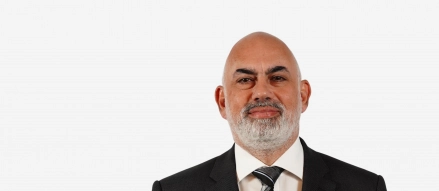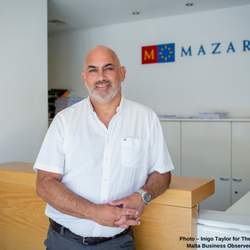
Mazars launches 'Netflix for CFOs'
International financial services firm Mazars has launched a one-of-a-kind web TV and media series, created by Chief Financial Officers (CFOs) for CFOs. Titled The Next CFO, the web TV series features seven programmes and candid interviews with CFOs from around the world, on topics ranging from how they spend their money, to the way their career path has evolved, to an investigation into the way that technology is shaking up the designation of CFO, as well as the world of finance as a whole.
“The purpose of the series is to help CFOs embrace their evolving role in a changing world, whilst giving the upcoming crop of finance professionals the inspiration that they need to continue along this path, and there’s no better way to do this than by having real CFOs sharing their stories,” said Managing Partner Anthony Attard. Mr Attard co-founded Mazars Malta (then Attard Giglio and Co.) with his school friend Paul Giglio, a few years after the pair left University, and the firm is celebrating its 20th anniversary this year. “We’re looking at CFOs from various generations and backgrounds, small or large companies, quite au courant with what is happening out there.”
Mr Attard said that the look and feel of The Next CFO was also inspired by the popular streaming service Netflix. “With The Next CFO, Mazars is embracing current media and tech trends, including binge-watching – if you want to watch three or four episodes in a row, you can. Uptake has been good, both from CFOs willing to take part, and from the people who have watched the episodes.” So what makes a CFO compelling viewing, worthy of being selected to be interviewed for this exciting new series? “What I would consider to be a worthy CFO is a CFO who is both interesting and interested,” Mr Attard explained. “Interesting as a person, in the way they handle their role, but also interested in our changing world, paying attention to what is happening, having the ability to adapt. The idea is to focus on the CFO of the future, not just of now, and certainly not of the past. I believe it makes for very interesting viewing for CFOs, or potential CFOs, who want to know what they are doing wrong, what they are doing right, and how other people are handling the challenges that a CFO faces.”
Mr Attard said that the role of a CFO has changed substantially in the past few years, and with it, the requirements that one needs in order to be a capable and effective executive in this position. “As a CFO, you need to have a wide range of skills. For example, the amount of information you receive nowadays in a company can be overwhelming, even in a small firm like ours, let alone in a major firm. So an effective CFO needs to be skilled at data analysis, knowing what numbers to look out for and what to do with them – the ability to parse what information is important for the company, and how they will analyse it, and put it to good use.”
Another important skill Mr Attard mentioned is a soft skill, one that may not be the first people think of when they think of a CFO. “You have to be able to understand people. You can no longer be what we used to call a number-cruncher – just sitting behind the desk ordering people around. The changes that have happened over the course of a few generations are massive, and unless you understand what the people around you think, and how they reason, you will not be able to get the best out of them, and the company will not be a success. You have to know what their expectations are, and how you can meet them. Otherwise, you’ll disrupt your own functionalities.”
CFOs, Mr Attard remarked, tend to be connecting agents between the older members of a company and the younger generation whose careers are just starting out, allowing them to mediate and find a compromise between two starkly different perspectives. “Indeed, any managerial position has to be able to bridge the gap between members of the Board who tend to be of a certain age, and employees who are younger, and who think a lot differently and expect very different things from their job.”
This is something Mr Attard has experienced first-hand – the company’s 70-strong workforce in Malta spans at least four generations, and the changes that have happened since the company was established have been monumental. “Back when we started this firm, internet was still on dial-up, and a laptop was a luxury – now it’s something you take for granted. Social media was non-existent – now clients expect you to have a presence on a corporate level, but interact with them as you would a friend. If you snub that, it might affect your professional relationship. I have teenagers who work in this office, and of course, their mentality and expectations are totally different to mine. But everyone has to understand and accept the changes in trends, particularly in an industry like ours, which is so reliant on technology. We have to be aware of both the threats and the potential that technology holds, and manage and meet the expectations of clients of all ages.”
Although The Next CFO may seem like a niche title, appealing only to a very select group of people, Mr Attard said he is confident that it has value for anyone who has an open mind, with an important lesson to impart. “The Next CFO showcases every aspect of the way these CFOs live – including the way they balance their lives and their work. Sometimes, addicted to work as we are – and I’m talking about a lot of people in business here – we may forget that there’s a life outside of work. When you see people who are managing to be successful in their job, in their profession, but finding ways of having a healthy private life too, I think there’s definitely something to be learned from that.”
The Next CFO is a venture that opens up the debate on business-related issues. “Our forte is that every single one of us is very much focused on the client and their ecosystem at large. We are very committed and very involved. We have built strong relationships with clients, institutions, business partners and they often recommend us to other companies, which is the biggest indicator that what we’re doing is working,” Mr Attard said.
Mr Attard added that since Mazars is a challenger in its field, it has to work smarter and it is distinguishing itself by this type of initiative. “We have a growing, global presence – we are growing steadily, but it’s not our ultimate goal. What we truly want is to be the firm that people instinctively turn to, that they can trust our professionalism, products and services.”
“Out there it’s a changing world; everything is transforming, from the way people do business, to legislation and compliance, to increased awareness about the expectations of an auditor, and what an auditor’s obligations are. Even though Malta is at the forefront of legislation for products such as cryptocurrency and Blockchain, at Mazars Malta we strive to ensure that from top to bottom, everyone understands the new world, even though it may seem alien to our traditional ways of doing business.”
This article first appeared in The Malta Business Observer July 2018 and on the Malta Chamber of Commerce Business Portal


